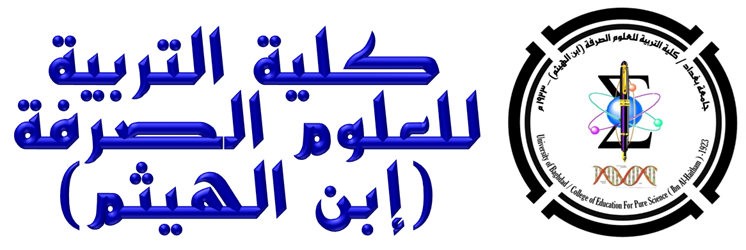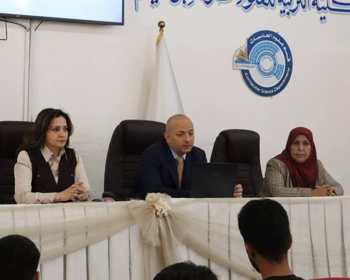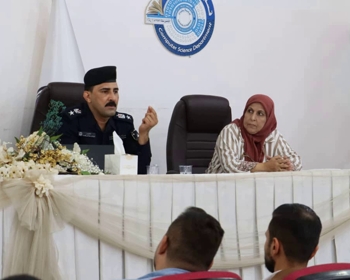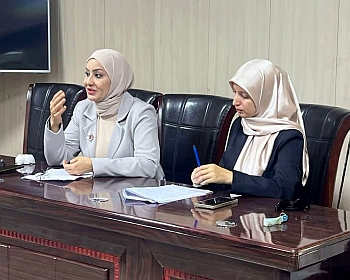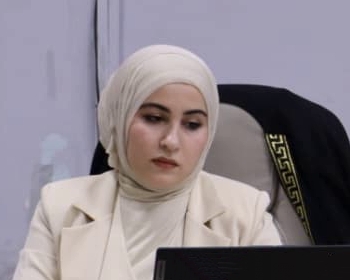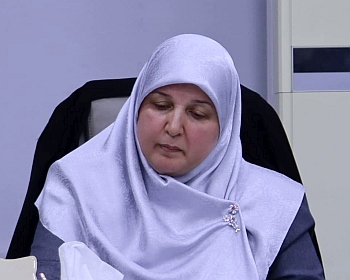ناقش قسم الكيمياء في كلية التربية للعوم الصرفة (ابن الهيثم) رسالة الماجستير الموسومة ” تحليل محتوى كتب الكيمياء للمرحلة المتوسطة على وفق الاخلاقيات البيئية ” للطالبة ” زهراء صلاح مصطفى ” التي انجزتها باشراف التدريسية في القسم ” أ.د. سوزان دريد احمد ” ونوقشت من قبل أعضاء لجنة المناقشة المبينة أسمائهم في ما يأتي :
-
أ.د. علي محمود نجم رئيساً
-
أ.د. اسماعيل ابراهيم علي عضواً
-
أ.د. ضمياء سالم داود عضواً
-
أ.د. سوزان دريد احمد عضواً ومشرفاً
ويهدف البحث إلى تحليل محتوى كتب الكيمياء للمرحلة المتوسطة والتي تشمل كلا من كتابي العلوم (وحدتي الكيمياء) للصفين الأول المتوسط والثاني المتوسط ، وكتاب الكيمياء للصف الثالث المتوسط على وفق الأخلاقيات البيئية للعام الدراسي (2021 _ 2022) م . ولتحقيق هدف البحث قامت الباحثة ببناء قائمة تحليل محتوى للأخلاقيات البيئية اعتماداً على الادبيات النظرية والدراسات السابقة والابحاث وتضمنت قائمة التحليل ثلاثة مجالات رئيسة هي (أخلاقيات حماية البيئة من التلوث ، وأخلاقيات حماية الموارد البيئية من الاستهلاك (ترشيد الاستهلاك) وحماية الكائنات الحية ، وأخلاقيات محو الأمية البيئية) ثم اشتقت منها (81) مؤشراً ، تم التحقق من صدقها بعرضها على مجموعة من المحكمين المختصين في المناهج وطرائق التدريس والقياس والتقويم ، واعتمدت الباحثة المنهج الوصفي التحليلي . وتكون مجتمع البحث وعينته من كتابي العلوم (وحدتي الكيمياء) للصفين الأول المتوسط والثاني المتوسط ، وكتاب الكيمياء للصف الثالث المتوسط المعتمدة من وزارة التربية العراقية للعام الدراسي (2021-2022) ، ثم قامت الباحثة بتحليل الكتب في ضوء قائمة التحليل المعدة بالاعتماد على الفكرة الصريحة والضمنية كوحدة للتسجيل والتكرار وحدة للتعداد . وقد تم التأكد من صدق التحليل باختيار أنموذج عشوائي من المادة المحللة وعرضها على عدد من المحكمين الذين اتفقوا على صلاح عملية التحليل ، ومن ثم إيجاد ثبات التحليل باتفاق الباحثة مع نفسها ومع محللتين خارجيتين باستعمال معادلة هولستي (Holiste) . وجاءت النتائج بتضمن كتاب الكيمياء للصف الثالث المتوسط (16) تكراراً بنسبة (47.1%) ، وكتاب العلوم (وحدتي الكيمياء) للصف الأول المتوسط (14) تكراراً بنسبة (41.1%) ، وكتاب العلوم (وحدتي الكيمياء) للصف الثاني المتوسط (4) تكرارات بنسبة (11.8%) ، توزعت بصورة متفاوتة بين المجالات الثلاثة ، وبناءً على ذلك تقدمت الباحثة بمجموعة من التوصيات وجملة من المقترحات وفقاً للنتائج التي توصلت إليها .
في ضوء نتائج البحث اوصت الباحثة بما يلي :
1- اهتمام المختصين بتطوير المناهج الدراسية بتضمين موضوعات الاخلاقيات البيئية في متطلبات المناهج الدراسية خاصة كتب علم الكيمياء للمرحلة المتوسطة .
2- مراعاة التوازن والتكامل والتنظيم بين كتب الكيمياء في تضمينها لمجالات الاخلاقيات البيئية .
3- الاعتماد على قائمة الأخلاقيات البيئية في تطوير مناهج الكيمياء .
4- ضرورة إقامة ورش عمل و مؤتمرات و دورات تدريبية لمدرسي ومدرسات الكيمياء لتوضيح الأخلاقيات البيئية مما ينعكس بنحو ايجابي على مستوى الطلبة .
5- تنمية المسؤولية الجماعية والفردية نحو البيئة عن طريق إسهام الطلبة في الحملات البيئية المنظمة والمخططة .
6- الإفادة من المبادرات العالمية الحديثة في تضمين الأخلاقيات البيئية في محتوى كتب الكيمياء .
Analysis for Chemistry Books Content Intermediate Level Schools According to Environmental Ethics
By Zahraa Salah Mustafa
Supervised by prof.Dr.Susan Duraid Ahmed
The current research aimed at analyzing the content of chemistry textbooks of the intermediate school which include two units of chemistry in the textbook of science of the first and second year classes, besides the chemistry textbook of the 3rd year class according to the environmental ethics for the academic year (2021–2022)
Abstract
The current research aimed at analyzing the content of chemistry textbooks of the intermediate school which include two units of chemistry in the textbook of science of the first and second year classes, besides the chemistry textbook of the 3rd year class according to the environmental ethics for the academic year (2021–2022). To achieve the aim of the research, the researcher has built a list of (analytical standards) for the environmental ethics depending on literature, previous studies and researches. The analytical list includes three main fields: (ethics of protecting environment from pollution, ethics of protecting the environmental sources from consumption and protecting the creatures and finally the ethics of eradicate literacy). Then the researcher has derived 81 indicators which were validated according to a group of judges specialized in curriculum, methods of teaching and evaluation and measurement. Then the researcher adopted the analytical descriptive method. The sample of the research was two units of chemistry in the textbook of science of the first and second year classes, besides the chemistry textbook of the 3rd year class which are approved by the Iraqi Ministry of Education, for the academic year (2021–2022). The researcher analyzed the textbooks in the light of the analytical list depending on the explicit and implicit idea as a unit for registering and repetition and a unit for enumeration. The validity of the analysis has been done according to a random model of the analyzed subject then they have been given to a number of judges who have agreed to the analyzing process. Then, the researcher has found the reliability of the analysis by the researcher herself with two other analysts by using (Holiste’s Formula). The results show that the textbook of chemistry of the third year class contains 16 repetitions in a ratio of 47.1% and the textbook of science which has two units of chemistry for the first year class shows 14 repetitions in ratio of 41.1% where is the scientific textbook of the second year class shows 4 repetition in the ratio of 11.8% distributed differently among three fields. According to that the researcher submitted some recommendation and suggestions in the light of the research
In light of the research results, the researcher recommends the following
-The interest of specialists in developing curricula by including environmental ethics in the curriculum requirements, especially chemistry books for the intermediate stage
-Taking into account the balance, integration and organization among the chemistry books in their inclusion of the areas of environmental ethics
-Relying on the list of environmental ethics in developing chemistry curricula
-The necessity of holding workshops, conferences and training courses for teachers of chemistry to clarify environmental ethics, which is reflected positively on the students’ level
-Develop collective and individual responsibility towards the environment through students’ participation in organized and planned environmental campaigns
-Benefiting from recent global initiatives in including environmental ethics in the content of chemistry books
